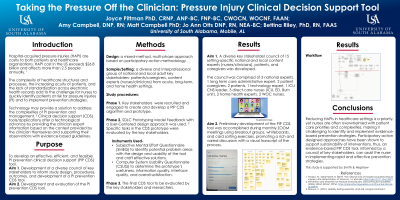Clinical Research
(CR-065) Taking the Pressure off the Clinician: Pressure Injury Prevention Clinical Decision Support Tool
Friday, May 2, 2025
7:45 PM - 8:45 PM East Coast USA Time

Amy Campbell, DNP, RN; Matt Campbell, PhD; Jo Ann Otts, DNP, RN, NEA-BC; Bettina Riley, PhD, RN
Introduction: Hospital-acquired pressure injuries (HAPI) cost in the US exceeds $26.8 billion and affects more than 2.5 people annually. The complexity of healthcare structures and processes, the increasing acuity of patients, and the lack of standardization across electronic health records add to the challenge for nurses to quickly identify patients at risk for pressure injuries (PI) and to implement prevention strategies. The purpose of this study is to develop an effective, efficient, and feasible PI prevention clinical decision support (PIP CDS) tool.
Methods: This study utilizes a mixed-method, multi-phase approach. Initially, an interprofessional and patient/caregiver council of key stakeholders (Council) was used to create and develop a PIP CDS algorithm and prototype. Continued study phases will focus on evaluating specific tasks performed using the prototype using a Subjective Mental Effort Questionnaire (SMEQ) to identify potential problem areas with the design and usability of the tool and craft effective solutions. The final tool will be evaluated by the Council and researchers using the Computer System Usability Questionnaire (CSUQ) to determine the prototype’s usefulness, information quality, interface quality, and overall satisfaction.
Results: A diverse key stakeholder council of 15 setting-specific national and local content experts (nurses/clinicians), patients, and caregivers was developed. Preliminary development of the PIP CDS tool was accomplished using feedback and perspective from the Council during monthly ZOOM meetings using multiple breakout groups, whiteboards, and card sorting exercises, promoting a rich and varied discussion and written feedback. PIP CDS tool development activities, Council feedback, and survey results will be presented at the conference.
Discussion: Reducing HAPIs in healthcare settings is a priority yet often nurses are overwhelmed with care priorities and patient complexities to quickly identify and implement evidence-based prevention strategies. An evidence-based PIP CDS tool, informed by a council of key stakeholders, will assist the nurse in implementing rapid and effective prevention strategies.
Methods: This study utilizes a mixed-method, multi-phase approach. Initially, an interprofessional and patient/caregiver council of key stakeholders (Council) was used to create and develop a PIP CDS algorithm and prototype. Continued study phases will focus on evaluating specific tasks performed using the prototype using a Subjective Mental Effort Questionnaire (SMEQ) to identify potential problem areas with the design and usability of the tool and craft effective solutions. The final tool will be evaluated by the Council and researchers using the Computer System Usability Questionnaire (CSUQ) to determine the prototype’s usefulness, information quality, interface quality, and overall satisfaction.
Results: A diverse key stakeholder council of 15 setting-specific national and local content experts (nurses/clinicians), patients, and caregivers was developed. Preliminary development of the PIP CDS tool was accomplished using feedback and perspective from the Council during monthly ZOOM meetings using multiple breakout groups, whiteboards, and card sorting exercises, promoting a rich and varied discussion and written feedback. PIP CDS tool development activities, Council feedback, and survey results will be presented at the conference.
Discussion: Reducing HAPIs in healthcare settings is a priority yet often nurses are overwhelmed with care priorities and patient complexities to quickly identify and implement evidence-based prevention strategies. An evidence-based PIP CDS tool, informed by a council of key stakeholders, will assist the nurse in implementing rapid and effective prevention strategies.

.jpg)